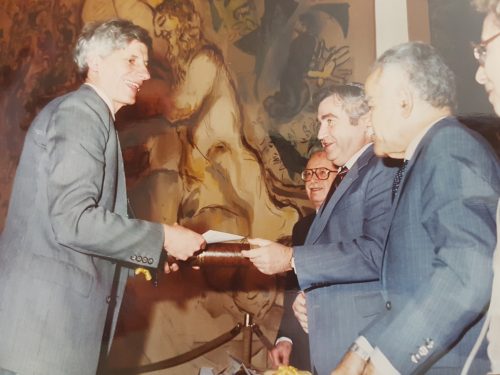Prof. David Thewles, the recent winner of the Nobel Prize in Physics, won the Wolf Prize already in 1990

The management of the Wolff Prize updates following last night's announcement of Prof. Thewles winning the Nobel Prize, because already in 1990, when he was only 56 years old, he won the Israeli Wolff Prize in the amount of 100,000 dollars. Thewles arrived in Israel in June 1990 and received the award from the hands of the late Prime Minister Yitzhak Shamir and the Minister of Education at the time, the late Zebulon Hamer.
The Wolf Prize has been awarded annually since 1978 to scientists and artists known for their unique contribution in various fields including agriculture, chemistry, mathematics, physics, medicine, music, architecture, painting and sculpture.
The Wolf Prize has a very prestigious international reputation, and is considered the second most important in the world after the Nobel Prize. The prize is considered a "Nobel predictor": about 33% percent of the Wolf Prize winners over the years have also won a Nobel Prize later on. Among the winners of the Wolf Prize who later also won the Nobel Prize are Prof. Ada Yonat and Prof. Dan Shechtman from Israel, Prof. Peter Higgs from Great Britain and the Japanese researcher Dr. Shinya Yamanaka.
In the reasons for the Wolf Prize Committee in 1990, it was written that "Professor David Thewles made first-of-its-kind contributions to the theoretical understanding of large-scale systems of atoms, electrons and nucleons. Among the phenomena he studied are superconductivity, properties of nuclear matter and collective oscillations within the nuclei of atoms. His works on disordered systems provided key ideas for understanding the transport processes of electrons in systems, where the localization phenomena according to Anderson Localization is known to be important. Thewles showed that there are results for the tracking phenomenon that can be measured in thin cables. His contribution to the theory of glass-spins was considerable and very important. In collaboration with Kosterlitz (JM Kosterlitz), developed a description for phase transitions of sub-vortices in two-dimensional systems with continuous symmetry. This work had impressive effects and many uses in other areas of physics. Thewles clearly presented the importance of topological concepts (and the variables accompanying them) in condensed matter physics, and demonstrated their contribution to the understanding of the quantum Hall effect."
see also:
The 2016 Nobel Prize in Physics for the discoverers of the strange states of matter

One response
On the one hand, it is impressive that in 1990, 26 years ago, a prize was given to someone who today receives a Nobel and testifies to the archaism of the Nobel and shame. I would conclude from this that the Wolf Prize is ahead of the credit for breakthroughs and is less conservative.